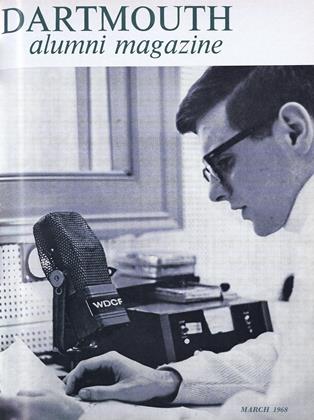ByArthur M. Cox '42. Washington: TheBrookings Institution, 1967. 178 pp. $3.95.
Violence at home and abroad is becoming an ever more acute and dangerous challenge to men's hopes for peace. In international politics the balance of terror has lessened the fear of imminent nuclear holocaust. That same balance of terror, however, by immobilizing the nuclear power of the United States and the Soviet Union, is partially responsible for the burgeoning of limited wars, civil insurrections, and other forms of violence endangering international peace.
In such a situation it is useful to have at hand an appraisal of the peace-keeping functions of the United Nations. These functions, which the 1945 drafters of the U.N. Charter did not clearly foresee, have developed as a response to the epidemic of armed struggles on a limited scale which have characterized the postwar era. The U.N. has engaged in peace-keeping opera- tions no less than eleven times in the last twenty years.
Arthur Cox's book is a worthwhile addition to the growing literature dealing with U.N. peace-keeping efforts. He correctly asserts that the key function of U.N. peaceoperations is to prevent or extinguish brushfire conflicts without provoking great power confrontations. Since the farflung interests of the great powers are so often in conflict, however, the scope for U.N. peace-keeping appears to be more limited than Mr. Cox suggests. The Soviet Union insists that all peace-keeping operations must be subject to exclusive Security Council control, where the major powers can exercise a veto. The Soviet position thus presages a restriction rather than an expansion of U.N. peace-keeping activities, despite the occasional Soviet willingness to deviate from its doctrinaire stance.
Mr. Cox is nonetheless right to urge American policy-makers to develop the peace-keeping potentialities of the United Nations to the fullest extent possible. Border disputes in Asia and Africa and ethnic disputes as in Cyprus are much more likely to be contained and damped down by an international force than by unilateral efforts by one or the other superpowers. Anyone who deplores violence on the international scene must offer energetic support to the U.N. in its capacity as a peace-keeping organization.
Professor of Government at Dartmouth, Mr.Sterling teaches a course examining the foreign policies of Great Britain, Canada, Germany, Israel, and India.
 View Full Issue
View Full Issue
More From This Issue
-
 Feature
FeatureNew Edition of Webster Papers
March 1968 By John Hurd '21 -
 Feature
Feature"Intensive" Is the Word for It
March 1968 By Joan Hier -
 Feature
FeatureWDCR Reports
March 1968 By LAURENCE G. BARNET '68 -
 Feature
FeatureDrama Critic
March 1968 -
 Feature
FeatureWhite House Fellow
March 1968 -
 Feature
FeatureDiscount Dynamo
March 1968 By MARIE WHITE
RICHARD W. STERLING
-
 Books
BooksTHE CASE FOR PEACE.
January 1956 By RICHARD W. STERLING -
 Books
BooksTHE UNITED STATES AND CANADA.
NOVEMBER 1964 By RICHARD W. STERLING -
 Books
BooksMINNESOTA AND THE MANIFEST DESTINY OF THE CANADIAN NORTHWEST.
APRIL 1966 By RICHARD W. STERLING -
 Books
BooksSOVIET-MIDDLE EAST RELATIONS (SOVIET-THIRD WORLD RELATIONS. Vol. I — A SURVEY IN THREE VOLUMES).
February 1974 By RICHARD W. STERLING -
 Cover Story
Cover StoryFragments of papyrus
DECEMBER • 1985 By RICHARD W. STERLING
Books
-
 Books
BooksFaculty Articles
December 1946 -
 Books
BooksTHE KID NEXT DOOR,
August 1944 By Herbert F. West '22 -
 Books
BooksA MODERN CONQUISTADOR. ROBERT BONTINE CUNNIN GHAME GRAHAM
February 1933 By John Hurd Jr -
 Books
BooksTHE COLLEGE LIBRARY BUILDING
November 1932 By N.L.Goodrich -
 Books
BooksMINNESOTA AND THE MANIFEST DESTINY OF THE CANADIAN NORTHWEST.
APRIL 1966 By RICHARD W. STERLING -
 Books
BooksA MASQUE OF REASON,
April 1945 By Sidney Cox.

